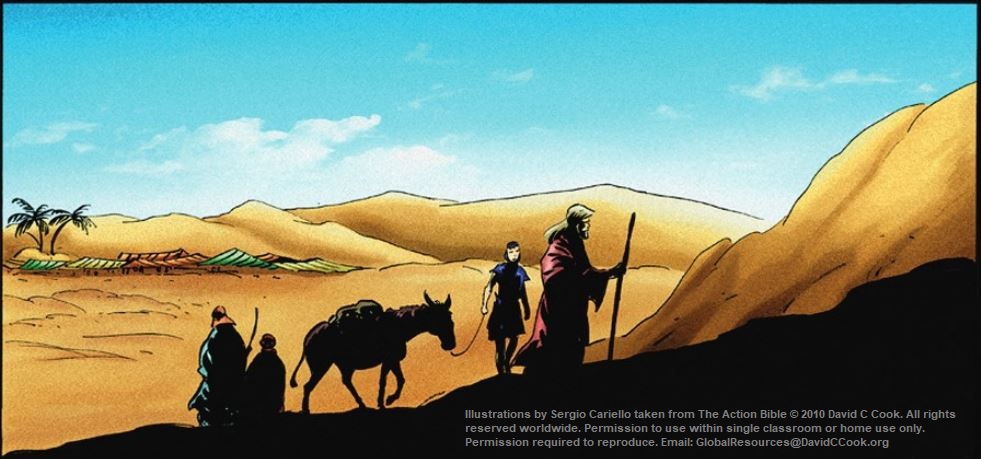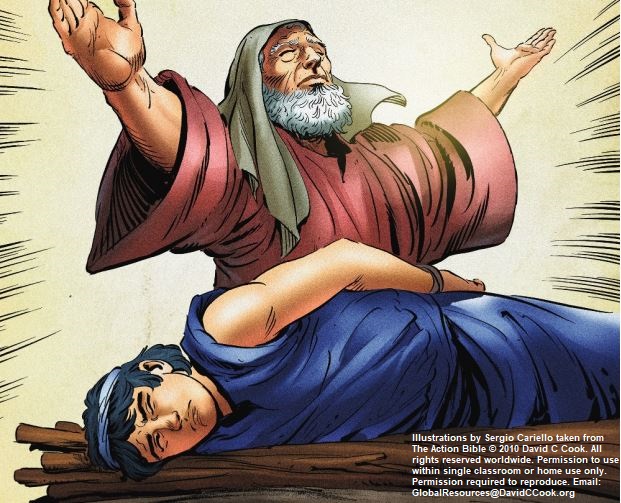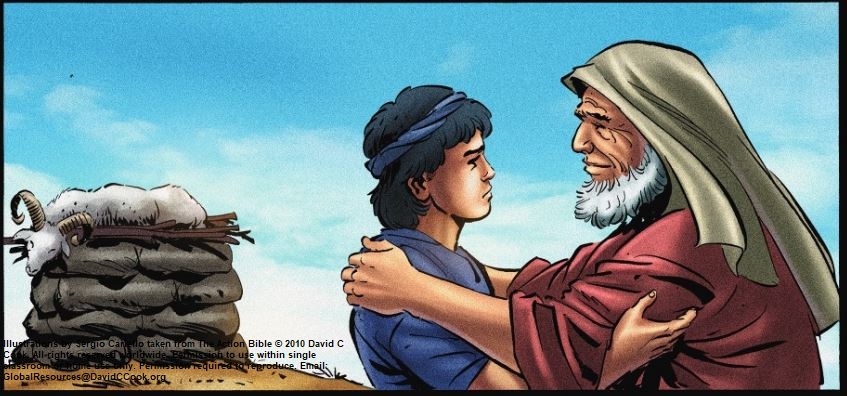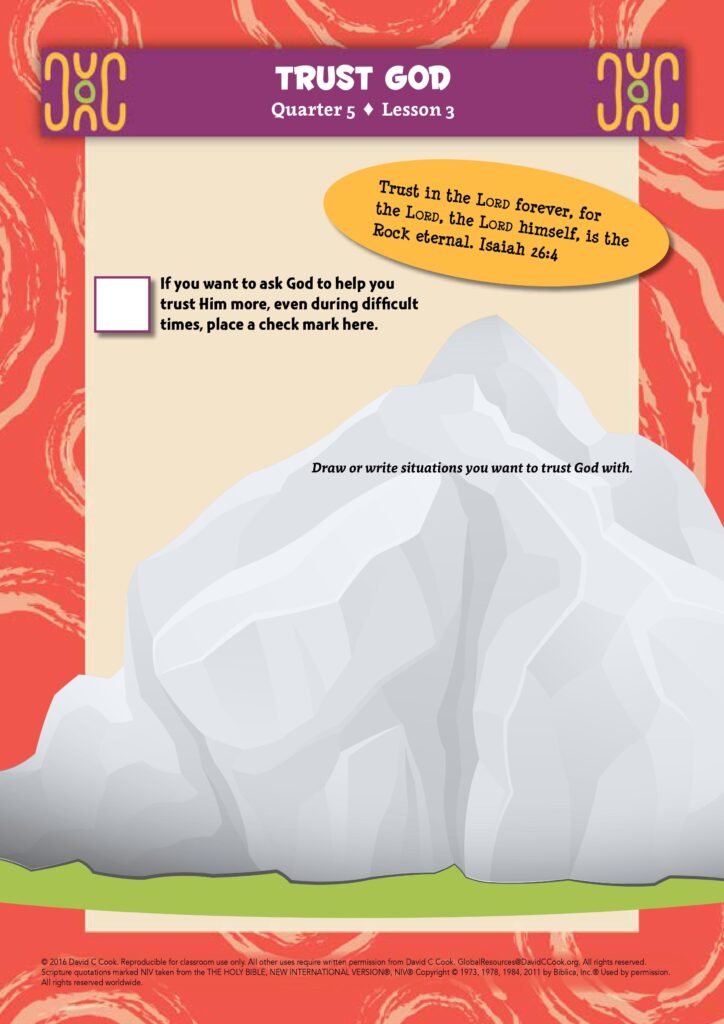During the lesson, the information for you to know is written in regular type, and what we suggest speaking or reading aloud to children is in bold. All resources for this lesson, including the Teacher Guide, Student Page, Family Connection Card, and other resources can be downloaded in a ZIP file by clicking on the following link:
In some lessons you will find "resource articles." These are articles written by experts from around the world to help equip you for your work with children and adolescents. Share them with parents or guardians if you consider it appropriate.
Trust in the Lord forever, for the Lord, the Lord himself, is the Rock eternal.
Isaiah 26:4
We know that God always keeps His promises. We know He loves us. We know His plan for us is right and good. So why is it so difficult to trust Him sometimes? Maybe it is because it is easier to believe in what we can see rather than believing when the situation is difficult and we have questions.
Abraham had seen God’s faithfulness before. He trusted God so much he was willing to kill his own son if that is what God asked, believing that God had the power to raise the dead (Hebrews 11:17–19).
Spend a few minutes praying each day this week that God will increase your trust in Him. Then pay attention as God shows that He is the Rock in your circumstances. May you grow in an unwavering trust in His faithfulness!
Tell families that children are learning this week about trusting God. Encourage them to ask their children about trust. Who do they trust? What makes a person trustworthy? What makes God trustworthy?
Teacher Tip: If possible, email or text the Family Connection Card to the families of your students.
As your children arrive, ask them about their weeks. As you show interest in their lives, they will trust you more and more with their thoughts, ideas, and feelings. Have the children sit in a circle.
Pass the medium-sized stone around the circle. As each child holds it, ask him to observe it closely and share what they notice about the stone. Ask them these questions as they pass the stone:
Listen carefully as I read a Bible verse that compares God to a rock.
Read Isaiah 26:4 from your Bible. Read it several times slowly. Invite children to say it with you as they learn it.
Trust in the Lord forever, for the Lord, the Lord himself, is the Rock eternal.
Isaiah 26:4
Optional Supplies: Print the Bible verse on the board or a large piece of paper before class. You will use it in all 3 sections of today’s class.
God never changes. He is strong and solid. We can trust Him with our lives just as we can trust a solid rock to hold us when we stand on it.
Divide children into groups of 3–4. Have each group create motions for each phrase of Isaiah 26:4. After several minutes, ask several groups to do their motions for the class as everyone says the verse together out loud.
The children have been learning about Abraham. Today they will hear about the hardest test Abraham experienced. This is the time he learned that he could trust in the Lord forever. Read or tell this story. If possible, show The Action Bible images as you tell the story.
As we learned last week, when God Himself and the two angels visited Abraham, God told him that the next year his wife, Sarah, would have a son. Sarah was 89 years old, and Abraham was even older—he was 99. They were too old to have a baby! Yet God was going to do the impossible. He was going to fulfil His promise to Abraham by giving him a son by Sarah.
The Lord kept His promise, and Abraham and Sarah had a baby. God always keeps His promises. Sarah said, “God has brought me laughter, and everyone who hears that I gave birth to a son will joyfully laugh with me.” Abraham and Sarah named their baby boy Isaac. Do you know what “Isaac” means? It means “he laughs.” What a happy name for a little child who really was a miracle baby.
Years passed, and Isaac was growing up. One day God told Abraham to do something strange. God told him, “Take Isaac, your special son Isaac, the boy you love, and go to the region of Moriah. Sacrifice him there as a burnt offering on one of the mountains that I will show you.”
Wow! This seemed too hard. The book of Genesis does not tell us what Abraham thought or felt. But the book of Hebrews in the New Testament tells us that “Abraham reasoned that God could raise the dead.”
Abraham knew that sacrificing a burnt offering meant giving God his best gifts by burning them on an altar. All his life, Abraham had given God his best animals as burnt offerings. But now God was asking Abraham to sacrifice the son God had given to fulfil His promise to Abraham.
The next morning Abraham got up and saddled his donkey. He took Isaac and two servants and enough wood for the burnt offering. He set out for the place God had told him about. They walked for three days.
If possible, show The Action Bible images as you tell the story.

Then Abraham said to the servants, “Stay here. Isaac and I will continue on. We will worship God and then meet you back here.” Abraham did not know what would happen, but he trusted God with his son, his most precious possession in the world.
Abraham and Isaac carried wood and the coals for the sacrifice. But Isaac knew something was missing. Isaac asked his father, “Where is the lamb we will sacrifice to the Lord?”
His father said, “God himself will provide the lamb for the burnt offering, my son.” They kept walking until they arrived at the place God had told Abraham about. There, Abraham built an altar and arranged the wood on it. He tied up Isaac and put him on the altar. Then, with a heavy heart, he took the knife to kill his son. Let’s read the next part directly from the Bible.
If possible, show The Action Bible images as you tell the story.

Read Genesis 22:11–12 from your Bible.
But the angel of the Lord called out to him from heaven, “Abraham! Abraham!” “Here I am,” he replied. “Do not lay a hand on the boy,” he said. “Do not do anything to him. Now I know that you fear God, because you have not withheld from me your son, your only son.”
Genesis 22:11–12
The Bible does not tell us, but we can imagine that Abraham probably felt great joy as he untied his boy and hugged and kissed him! The altar was built and ready for a sacrifice. Abraham looked around and saw a ram caught by its horns in the branches of a small bush. This was not a coincidence. God had put the ram there. Abraham took the ram and sacrificed it as an offering instead of Isaac.
If possible, show The Action Bible images as you tell the story.

Abraham called the place, “The Lord Will Provide,” because the Lord had provided a sacrifice, a ram. Isaac would live. Abraham knew that he could trust God. He knew God would continue to provide for him in difficult situations.
Have students stand up and recite Isaiah 26:4 while doing the motions they created earlier. Read it directly from a Bible as the children say it out loud.
Trust in the Lord forever, for the Lord, the Lord himself, is the Rock eternal.
Isaiah 26:4
He is unchanging and solid. Abraham knew he could trust God just like we can trust a solid rock to hold us when we stand on it. God told Abraham not to kill Isaac and provided a ram to sacrifice instead.
Optional: If you are using The Action Bible, have the children read the story on pages 60–63.
Abraham trusted God with the life of his precious son. We can trust God with everything that is precious to us. God wants us to be like Abraham and trust Him with everything in our lives.
Let’s do an activity to show how you would feel if you fully trusted God. I will read some statements. After each one, use your bodies and faces to show how it would feel to trust God in that area or situation. For example, if you would feel happy, smile and jump up and down.
Have children spread out and remain standing. Pause after reading each statement so the children can act out their feelings. You can use these statements or create your own.
Optional Supplies: Hand out paper and crayons to the children. Have them draw their feelings instead of acting out what they would feel in response to the previous statements. For this option, you may want to just use 2–3 statements rather than all of them. Children can share with partners after each statement.
Ask children to stand and spread out. Have them do their motions as you say Isaiah 26:4 together.
Show the Memory Verse poster if you are using it.
Trust in the Lord forever, for the Lord, the Lord himself, is the Rock eternal.
Isaiah 26:4

Give each child a rock to keep as a reminder that God is solid and trustworthy. They can hold these while you lead them through thinking and praying over their response.
Keep your rocks as a reminder that God is the Rock. You can trust Him!
Optional: If you are using Student Pages, the children can respond to this activity on their pages.

Close by praying this blessing based on Psalm 18:2 over the children:
Blessing: God is your Rock, your fortress during difficult times. May your trust in Him increase this week. Place all your weight on the Rock. He will hold you!
Lead the students in singing this quarter’s song, if possible.
Life on Life ©2020 David C Cook. Reproducible for home or classroom use only. All other uses require written permission from David C Cook [email protected]. All rights reserved.